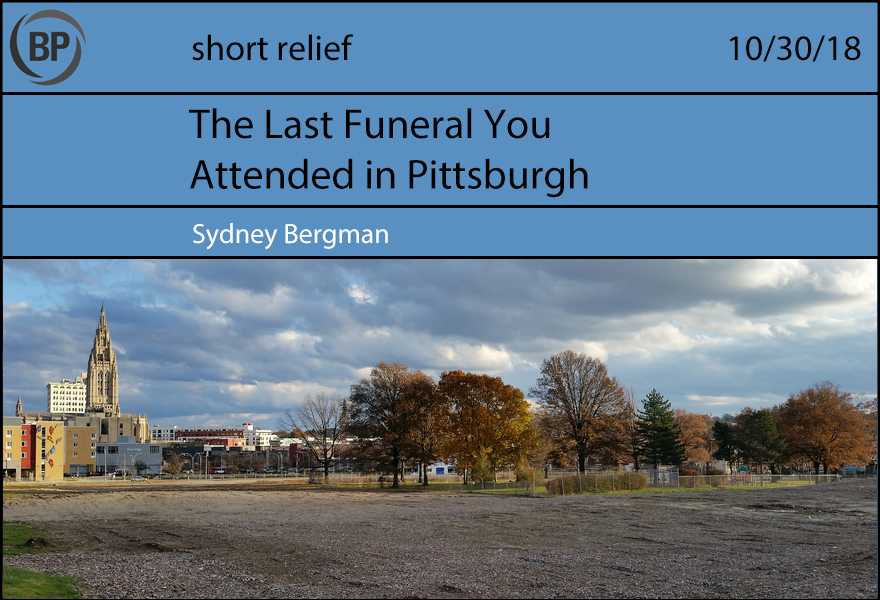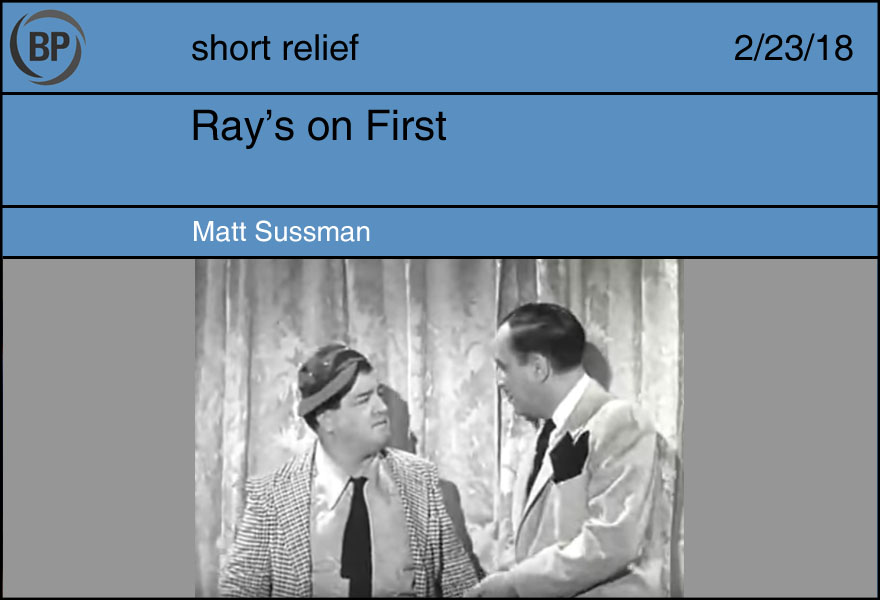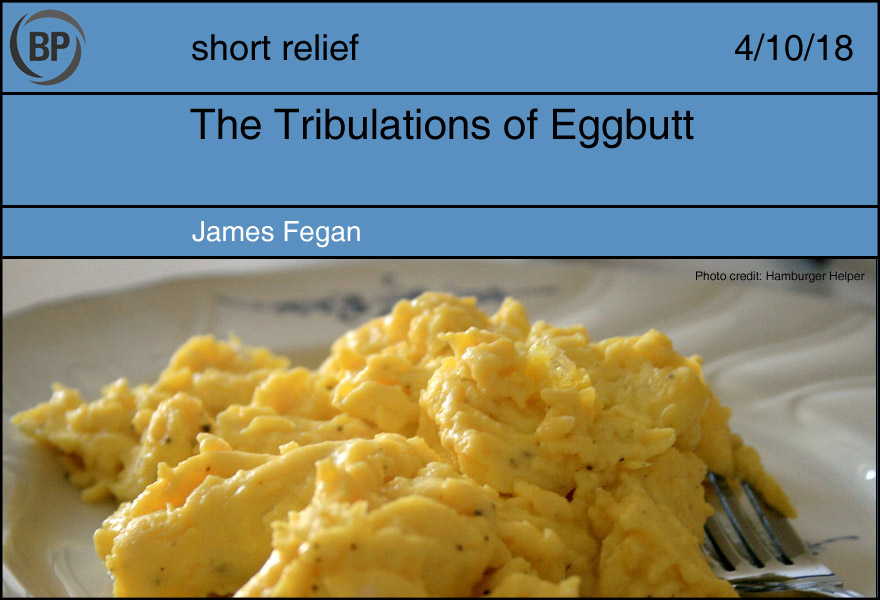
Don’t think about the last time you attended a funeral in Pittsburgh. Don’t think about your great aunt’s funeral on one of those cold gray days the city specializes in. A city with less sunshine than Seattle; a city clouded in funereal gray. Your sister stands next to you, and your shoes sink in the wet dirt. There’s not much said graveside, and you know what they’re saying anyway. The point of a ritual is to give you something to say when you don’t know what to say.
Your great aunt was old when she passed and always favored your sister over you. Mostly because you were obnoxious as a teenager, as a young adult. Still are sometimes. It’s not one of those funerals where people treat death as a tragedy. She was old and lived a long good life. Mostly, you just feel cold and damp, Pittsburgh feelings. You think about the last time you saw your great aunt and wonder if you were obnoxious to her, the way you’d been when you’d hiked up the big hill to her senior living facility to pick up two tickets for Rosh Hashanah. You probably were.
The sky is slate gray, raining or at least not not-raining. You’re a little bored, and know that you’ll have to go to your relatives’ house after. There will be food, and you’re in college. Anything not cooked by campus food services or your own instant pot is good. The food will be good. That’s how you process grief — carbohydrates. That’s also how you process joy, anger, disdain, and boredom. Your aunts and cousins will sit and tell stories about your great aunt. It’s one of the best and worst things about funerals — it makes you think about what people will say about you after you’re dead. About what you’ll say about your family.
There’s a gravestone next to where you’re standing, something new and unweathered. You read it and plaster a hand across your mouth to keep from laughing. On it, two crossed bats. An inscription that says “Beat ’em Bucs.” A Pirates fan, forever. You wonder what archeologists will say when they dig up this part of the Jewish cemetery.
It’s funny, the kind of thing that’s not really funny until you’re standing on a gray hillside overlooking a gray city, surrounded by family, at something where you absolutely cannot laugh. You nudge your sister because you want to share the absurdity of it, of loving baseball the way that people who cite themselves as mothers and wives and sisters on their tombstones. Baseball as your most enduring relationship, your legacy.
Later, you realize that a grave marker that says “Beat ’em Bucs,” is the kind of grave marker people pick out for themselves, something drafted when you know death is coming and can prepare for it. Of needing something to say, and finding the exact words, even if other people find them silly. At your cousins’ house, you eat carbohydrates and listen to your relatives talk. They tell stories about your great aunt and even the bad ones sound good.
Years pass, and on a Saturday morning, you sit at brunch listening to your friends talk about their latest home repairs. They look at you like you might cry because you’ve been crying. They hug you, and you try not to think about any of it, especially the last funeral you attended in Pittsburgh, and the power of choosing how the world remembers you, and of that power denied.

ABBOTT: Costello, I’m happy to announce that I’m going to work with the Tampa Bay Rays baseball team as a coach. We’re very excited about the season.
COSTELLO: Tampa, you say? I bet you know all the ballplayer names.
ABBOTT: [brief panicked pause] Of course I do. A good coach knows all his players’ names.
COSTELLO: Then I bet you can tell me all the players names!
ABBOTT: [longer, but unremarkable pause] I wouldn’t be a good coach if I didn’t know all the players names.
COSTELLO: Then tell me this, what are the names of the players on the infield?
ABBOTT: Well, we have a great infield. Lots of talent all around the horn. Probably some All-Stars in the lot, I imagine.
COSTELLO: That’s great, but I’m really just interested in the names.
ABBOTT: I’m sure you are. It’s nice to know the names. It helps build a fanbase. And you’re going to know them all very soon.
COSTELLO: Good, because I was just asking you who—
ABBOTT: And you’ll learn them in due time. It’s a process. The current business atmosphere of professional sports requires teams to sometimes be creative, especially when the free agent market doesn’t turn out the way we expected it to be. You also have to consider who else is in our division and what they are doing and have already done.
COSTELLO: So, what’s the name of the shortsto—
ABBOTT: It’s a process.
COSTELLO: It’s a process to tell me the name?
ABBOTT: Part of building a successful team is looking at all the pieces and figuring out what works and what doesn’t. It doesn’t happen overnight. And I’m sure you’ll be with us every step of the way.
COSTELLO: Okay, do you have a pitcher?
ABBOTT: Chris Archer.
COSTELLO: How about the outfield?
ABBOTT: Kevin Kiermaier!
COSTELLO: And who are the other two?
ABBOTT: The great thing about baseball that I’m excited for is working with players and putting them in positions to succeed. There are going to be some growing pains but we’re going to put together a competitive team and win some ball games. What I can tell you is that you’re going to learn some of their names very soon.
COSTELLO: I’m asking you right now!
ABBOTT AND COSTELLO [simultaneously]: It’s a process.

I sat on the bed and stared. Jesuline was the sexiest woman I’d ever seen; Nefertiti in tight jeans and mirror shades. She took off her denim jacket to expose a white tank top and a Glock 19. She pulled it from its holster and asked, “Do you mind?” Not at all, I said, and she laid it on the bed. “Where I live, I have to protect myself.”
She washed her hands and put on a fresh top. Gun returned to holster, she put her jacket back on. How did she do it? I was wearing as little as possible in the sweltering tropical heat. “Come on,” she said. “I have a Jeep. It has air conditioning.” We parked near the soccer field and chatted the afternoon away as only young women can, engine running, A/C blowing, stories flying. I was absorbed by her, oblivious to the rural life revolving around us. But she was ever watchful.
Jesuline’s mother gave her away when she was four. She became a house slave in Port-au-Prince, but when she turned seven she ran away and found a construction site that was hiring children. They were only hiring boys, she said. Pride filled her voice. “I became a boy. I hauled buckets of sand all day, and at night I slept under a car.”
Haiti flooded with missionaries after the 2010 earthquake, and a Christian family found Jesuline and took her home to Indianapolis. They gave her a childhood. They noticed her and loved her and raised her to be among the world. One day they took her to Wabash College to visit their oldest son and Jesuline saw a student-staff baseball game in progress. She wanted to play, and her American mother made it happen. Over the angry objections of the students and the genteel harrumphing of the faculty, she got in the game.
She had always wanted to guard the plate, so she was excited when they put her at catcher. They figured she couldn’t do a lot of damage there. But then somebody hit a deep fly. It was caught, but a guy was tagging up from second and coming around. “Girl at the plate so he was coming in,” she said. “They threw me the ball. I was right out in front of the plate when I caught it and swiped, and that kid was out. He was shocked. A girl got him out at the plate. As if boys know anything about girls,” she added, with obvious scorn.
Now an RN, she had raised enough money to buy ten acres of land northwest of Port-au-Prince, where she lived alone with the Glock for protection. Slowly but surely, she was building an orphanage, one donation at a time. “I’ll teach the children hardball,” she said. “Come with me.” We looked at each other, waiting. Life with her would be a riot of power and glory. But I only muttered something about heading home.

It’s the 9th inning; your team is clinging to a one-run lead on the road with two outs. As first baseman, it’s your job to pretty much just play catch with your teammates and not screw anything up, but there’s a problem. The left fielder and former teammate you despise has stepped into the batter’s box.
Last season he sat on your plate of pregame scrambled eggs, and when you pointed it out, he proceeded to invite you to eat the surface on which your eggs had become smeared. Then he followed it up by calling you “Eggbutt,” even though he sat on your eggs with his butt. Even in the April cold, your blood boils under your skin as you recall the manager writing “Eggbutt,” on the lineup card because it had become so widespread he thought it was your new nickname.
1. The time for revenge is at hand
{ } The best revenge is living well. Wave to him from first base and smile. Maybe yell “I’m feeling pretty good!”
{ } Refer to your pithy rejoinder–“Now who is eggbutt?”–that you have prepared and written on a note card kept in your pocket.
{X} Plot to physically injure him and make it appear to have occurred in the normal course of a game.
{ } You are working at your job and this is definitely not the time for revenge.
2. The left fielder–The Real Eggbutt, if people were being honest–bounces a grounder to your position at first base. The key here is to act natural
{ } Field it calmly, step on first base, make firm eye contact and say “Can a butt with eggs do this and win the game? Sounds like someone else has eggs associated with their butt.”
{ } Field it calmly, step on first base, began twirling your arms like a water sprinkler and hope you makes contact with him. Make water sprinkler noises with your mouth so as to indicate that you have become a sprinkler and are not culpable for causing physical harm.
{ } Field it calmly, step on first base, and lean backward to an imperceptible degree that leads him grazing you as he passes, or maybe slightly tweaking his ankle as he steps to avoid you.
{X} Let the ball through the infield so you can clothesline him as he rounds first.
3. Clumsily swinging your arm at the left fielder has flipped the batting helmet off his head as he passes, but he remains uninjured
{ } “Whoopsidoodle!” Pretend like it was a mistake and fetch his helmet. Blame it on a protein deficiency related to eating fewer eggs.
{ } “There’s more where that came from!” you yell at the back of his head as he continues to run to second and your teammates yell at you.
{ } Run him down and sink your teeth into his trapezius muscle. You could probably eat 1.7 percent of his physical mass before they broke the grip of your jaws with a wrench.
{X} Sink into the dirt and curl into the fetal position. Bury your head into your own chest and close your eyes, and hope that when you next open them that the game is over and everyone is gone.
4. The game is not over and no one has left and you’re still on the ground and everyone is staring, including that jerk who sat on your eggs oh god
{ } Try again.
{ } Pop up and pretend like nothing happened. Keep yelling the number of outs in the inning to indicate that you are locked in and focused. “Two! Two!” Hold up your index and pinky finger in that weird baseball player style. “Two!”
{ } Address the lingering bitterness you have with your former teammate and speak about how it has made you feel with a level of sincerity and openness that cannot help but elicit his pure, natural human sympathy
{X} Try again, but sing something from the “Cats” original soundtrack to drown out the sound everyone asking you what you’re doing.

Yesterday, I left my home of two years. Like any move, this one was physically and mentally draining. That we scheduled our departure for the hottest weekend of the summer didn’t help.
The emotional toll proved even more taxing. This was a house where I grew immensely as an adult. It was here that I grieved over the death of my mother. Where I overcame my reflexive hesitation to Make Big Decisions and proposed to my girlfriend. Where I pursued my dreams in baseball and made peace with the idea that they may always flutter out of reach.
It was also a home where the four of us broadened the friendships that tie us together. In two years, we never fought over the shower, the garbage or the laundry. Chores were mostly done promptly and no one left for the store without checking to see if others needed milk or a Nerds Rope. In the darkest hours, it was a place where you could get a hug without ever letting on that you needed one, and where I’ve laughed as hard as any man ever has. I’m hopelessly sentimental and nostalgic; I knew how tough this day would be six months ago.
And yet it was time to move. My girlfriend is now my wife, and while the bonhomie in our group never dissipated, all good things come to an end. As Branch Rickey said, it’s better to trade a man a year too early than a year too late.
When my wife and I pulled out of the driveway, we stopped for a moment and stared at the house. A light in the garage illuminated the familiar beige walls and red trim, the enduring manifestation of two years worth of memories. It’s a place we love dearly—and one we probably won’t ever step inside again.
The end of a lease is a funny time. Technically, we have the run of the place until tomorrow, the strange opportunity to enter now or never again. I want, and crave, the inverse: to leave quietly for the evening and forever retain the freedom to return.
***
Felix Hernandez hasn’t been right in three years. It is painfully clear that his arm no longer has the strength or the magic that made him special, a point grimly emphasized by the vacant expression and resounding sadness of the man reacting to his last outing.
As he answered reporters, Oakland won again and Seattle’s once formidable lead in the Wild Card standings slipped to two games. The Mariners, saddled with the longest playoff drought in major American sports, are on the verge of extending their streak in an agonizing manner.
For a certain breed of fans—the ones who fully embraced their ace during the team’s 15 year romance with mediocrity—the damage may yet be greater. For years, Hernandez was the only player who punctuated lifeless Mariners ball clubs. He adorably (and bizarrely) expressed a desire to win in Seattle, signing not one but two contract extensions on the eve of his free agency. Mariners fans have long dreaded the possibility that Hernandez may never pitch in the playoffs for the team and the city that he loves. The only way to compound the sadness of this team’s potential collapse down the stretch would be to make Felix the face of it.
For all the hand-wringing, Felix Hernandez will make his next scheduled start. I wouldn’t say that I want to see it, but I do want to watch him forever.
Thank you for reading
This is a free article. If you enjoyed it, consider subscribing to Baseball Prospectus. Subscriptions support ongoing public baseball research and analysis in an increasingly proprietary environment.
Subscribe now